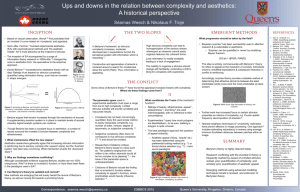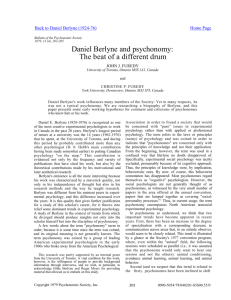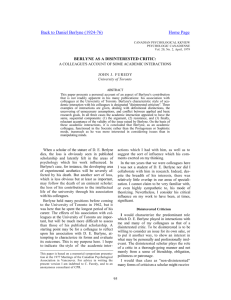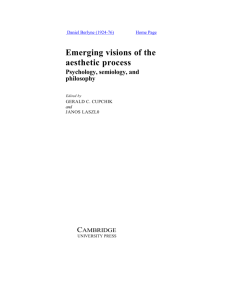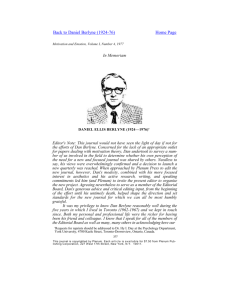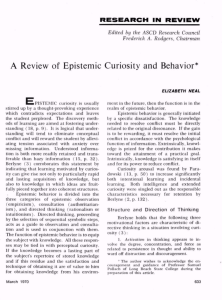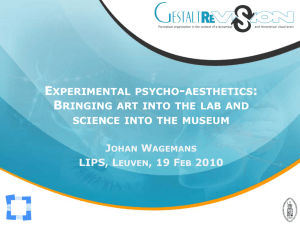Chapter in Advances in Intrinsic Motivations and Aesthetics (1980)
advertisement
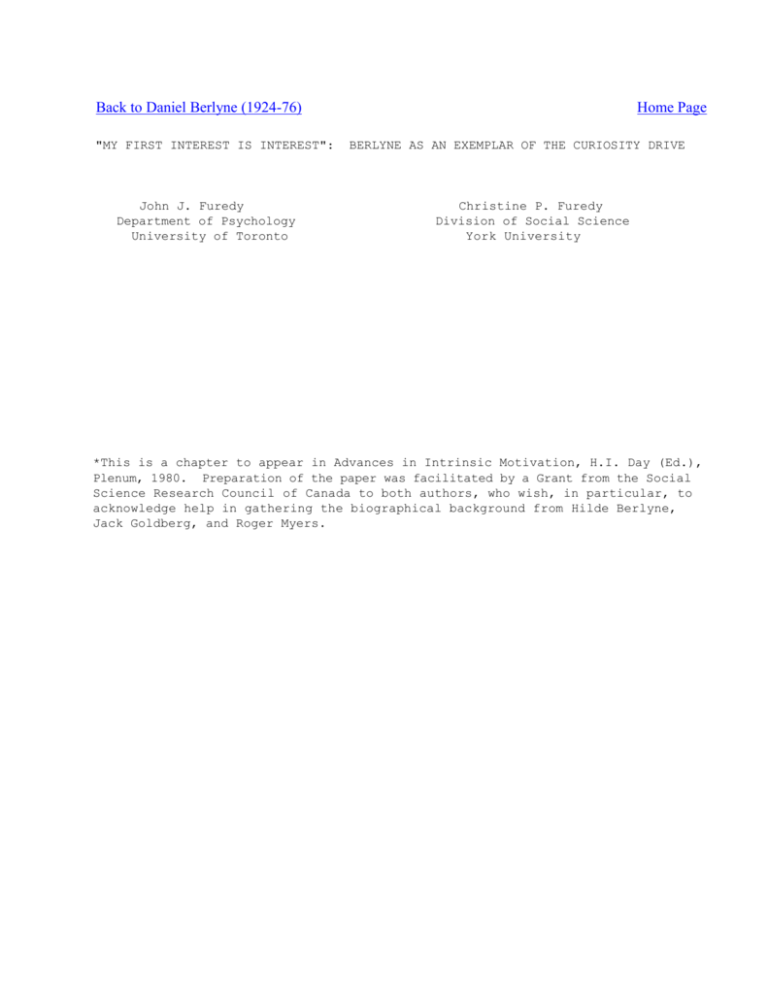
Back to Daniel Berlyne (1924-76) "MY FIRST INTEREST IS INTEREST": John J. Furedy Department of Psychology University of Toronto Home Page BERLYNE AS AN EXEMPLAR OF THE CURIOSITY DRIVE Christine P. Furedy Division of Social Science York University *This is a chapter to appear in Advances in Intrinsic Motivation, H.I. Day (Ed.), Plenum, 1980. Preparation of the paper was facilitated by a Grant from the Social Science Research Council of Canada to both authors, who wish, in particular, to acknowledge help in gathering the biographical background from Hilde Berlyne, Jack Goldberg, and Roger Myers. "My First Interest is Interest": Berlyne as an Exemplar of the Curiosity Drive. John J. Furedy University of Toronto and Christine Furedy York University The quotation of the title is not simply a young man's clever aphorism. It became, for Daniel E. Berlyne, a motto for a life of scientific research. It cannot be found in the voluminous published works which Berlyne completed in his tragically truncated academic career, but we know that he repeated it many times at the outset of his career from the independent recall of academic friends. There is every reason to believe that it continued to be a guiding maxim for the rest of his life. We can regard it as one modern psychologist's equivalent of the dictum of Socrates that "the unexamined life is not worth living". There is more to Berlyne's motto than first appears, once we consider the context in which it was coined and the implications which his early interest in interest and curiosity had for the rest of his career. In this chapter we will explore some of the possible origins of Daniel Berlyne’s intellectual "drive" and some manifestations of it in his later interactions with colleagues at the University of Toronto. Our thesis is that besides studying curiosity as a scientist, Berlyne exemplified, from his youth, some of the more fruitful or "higher order" elements of scientific curiosity. His work was characterized by independence of thought and the rare ability to play the role of a disinterested critic for colleagues and students even for ideas outside his many areas of research and specialization. This interpretation is not derived from an analysis of Berlyne's writings or from the published principles of motivational theory for we think that Berlyne did not so much publicly advocate a Socratic approach to an investigatory, life as he lived it. We wish, rather, to explicate the origins and nature of Berlyne's intellectual style, his mode of operation as an academic, as revealed by his interactions with colleagues and friends rather than by his scholarly publications Our major sources, then, comprise: (a) a number of letters which Berlyne wrote to a lifelong friend between 1942 and 1950; (b) interviews we have conducted since 1977 with Berlyne's colleagues, relatives and friends; (c) an interview conducted by R.C. Myers in 1973 with Berlyne as part of the former's historical work with eminent Canadian psychologists. (This Berlyne-with-Myers interview has been transcribed and will here be cited as BMI.), and (d) recollections by the first author of academic interactions with Berlyne during his period at the University of Toronto. When a colleague dies relatively suddenly, and prematurely, one is inclined to "summarize" the person on the basis of personal recollection, however limited that may be. When Daniel Berlyne died, the characterization that immediately occurred to the first author was the concept of the "disinterested critic", the Socratic-like scholar (cf. Furedy, 1979). Later, when we embarked on our research into Berlyne's life and career (cf. Furedy & Furedy, 1978), we were struck just as forcefully by another characteristic: his great independence of mind. This was perhaps most strikingly evident in his career-long engagement with the Hullian S-R approach to psychology. Independently of his peers and teachers and without meeting Hull, he, as a Cambridge undergraduate, espoused the approach simply through reading the 1943 Principles for himself. Then, in a move that made him seem too "cognitive" to the dominant S-R psychologists of the fifties and early sixties, he began his career by arguing for the "non-biologically"-based motive of curiosity rather than sticking to the orthodox Hullian and more scientifically respectable "biological" drives like hunger and thirst. Finally, at the close of his life, in his "To Hull with them all" (Berlyne, 1975) paper, he continued to argue for a return to the Hullian emphasis on the importance of motivational factors and unified theories to explain behavior at a time when experimental psychology or "psychonomy" (Furedy and Furedy, 1978, p.203) had become cognitive, amotivational, and no longer interested in the "grand theory" approach. So we became intrigued by these characteristics. What evidence could we find of the development of independence of thought and the ability to be disinterestedly critical in Berlyne's early education and career? How were these qualities displayed in aspects of his later life? We present here some hypotheses which at least to some extent help to explain a scholar whom we regard as exemplifying the curiosity drive of a scientist and as illustrating the potential power of intrinsic motivation in accounting for the behavior of at least some organisms. We hope, also, that this examination will prompt thought about the life of the scientist and the education which shapes a scientific mind. Curiosity in Youth and Early Career Curiosity and independence of mind are readily apparent in Berlyne's early childhood. By his own account (BMI), Berlyne was something of a loner. The son of a Jewish small manufacturer, he was conscious of being relatively better-off than most of the neighbouring families in Salford, Manchester. It was clear very early that he lacked good motor-skills co-ordination and functioned poorly in most boys' games. "When it came to kicking balls, catching balls, I was always butterfingers", he recalled, "I just couldn't do it and I wasn't particularly interested in it." But he was intellectually precocious, being able to read before entering school at age six. He was the eldest of three children. His sister and brother were younger by five and ten years respectively and Daniel appears to have enjoyed a certain intellectual status in the family, derived from both his scholastic achievements and a certain judicial quality. He was called, within the family "the judge". His sister in particular often looked to him rather than to their parents for arbitration in intellectual and artistic matters. His mother recalls an anecdote which suggests that Daniel had an enquiring and empirical frame of mind as a young boy. Noticing the destination sign on a Manchester bus he asked where it was going. His mother told him. "How do you know that it will go there?" he asked. He was not satisfied with the reply that "the sign says so". He insisted that they should get on the bus and ride to the terminal as this was the only way to be sure that the bus would, in fact, go there. Mrs. Berlyne indulged this whim: she must have reinforced on many other occasions such manifestations of intrinsic motivation and empirical curiosity. In the interview with Dr. Myers, Berlyne recalled the first three times he heard the words "psychology" or "psychoanalysis". His teacher in elementary school explained one day that some boys who didn't want to go to school told their mummies that they had a tummy ache and very soon they actually developed a tummy ache. She asked the class if they knew who it was who studied such things and told them that they were called "psychologists". The second occasion was in high school. A history teacher was talking about Vienna. He said that the city had made many contributions to culture, especially through musicians, and then asked if they knew what science had been founded in Vienna. He referred to psychoanalysis. The third time was at the end of his high school days. The day after Poland was invaded in September 1939 a vast evacuation programme was implemented for English schools. Dan's school was sent to Blackpool where they shared a school with local students. The visiting students went to classes for only half a day, leaving much spare time for (in Dan's case) reading and discussion. Later that month, Sigmund Freud died in London and the papers carried obituaries. A classmate went to the Blackpool library and took out Freud's Introductory Lectures. He showed the book to Dan and some friends: "We found this very interesting. There obviously was salacious appeal which was part of it, but apart from that, this was a new world of ideas, interesting ideas. Whether they were true or not, we couldn't help finding them interesting. And so we talked about these and when we got back, I read more about it." (BMI, p. 40). Thus Berlyne's first encounters with the concept of psychology as a field of study shared some features: in each case there was an enquiring, experiential aspect of the discussion of the word. The Blackpool incident seems to us to demonstrate a high degree of intrinsic motivation. Berlyne's high school was Manchester Grammar, a highly selective school which "creamed off" 1400 of the best male students in and around Manchester. Entrance was through an intensely competitive examination. Within the school, streaming by achievement was continuous and all-pervasive. That is, in every grade and every subject, pupils were placed in classes A, B, C, D, etc on the basis of examination performance in the previous year. Among the students, the 'Scholarship boys' (of which Berlyne was one) felt they were "an elite of the elite" (BMI p. 18). In such a streamed system an intelligent, independent student can go forward without developing skills of "getting on with" others. We think this is related to Berlyne's later ability to pursue ideas independently of the "approval" of colleagues and dominant "schools" in psychology. Berlyne believed that the vast majority of the students did not have intellectual values (BMI p. 25). He identified closely with the serious scholarship boys, but still felt isolated. The pressure of the examination system did not narrow his focus. He did extremely well, particularly at languages, but he never saw examinations as ends in themselves. When the routine of school life was broken as it was in 1939, he was not at a loss for intellectual pursuits. Whereas many boys simply wasted time during the Blackpool period, Berlyne was greatly stimulated, his excitement being enhanced by the fact that this was his first time "away from home" (BMI, p. 39). It seems, then, that Berlyne's high school experience reinforced his interest in subjects for their own sakes. He learned the joy of mastery of languages while recognizing that he could never perform more than adequately in art or even mathematics (BMI, pp 19-20). Significantly, he remained interested in both these subjects throughout his life, despite his relatively low level of aptitude for them. At age 16 Berlyne won four separate scholarships to Cambridge University: the Trinity College modern languages, a UK government scholarship, a Manchester city and a Salford city one. He went up to Cambridge in 1941, a young student among 17 and 18 year olds, to study modern languages. This initial Cambridge period lasted until he was called up in the fall of 1942. Towards the end of it, he began to recognize that he was disillusioned with the prospect of becoming a scholar of modern languages for the rest of his life. The main reason that he gave, rather casually in conversation with Roger Myers, is important, "But then I was asking myself: Do I really want to spend the rest of my life writing about Goethe and Schiller or reading books about them? I didn't mind reading Goethe and Schiller, but literary criticism... didn't seem to be what I wanted to do." (BMI, p. 53). Literary criticism held no prospect for really original work and consequently he no longer regarded it as stimulating in the long term. Concurrently, Berlyne revelled in the intellectual life of Cambridge. He enjoyed exploring ideas outside the classroom and beyond his specialism in University clubs and coffee houses with a group of close friends pursuing differing courses of study. Within this intellectual circle Berlyne was regarded as a wit, a vivacious and accomplished conversationalist. He saw this period of intense social interaction as an important change in his life, in distinct contrast with his relative isolation in high school (BMI, p. 52). This stimulating intellectual life and his doubts about his future career were suspended abruptly in 1942 by military service. He became a private in the Intelligence section of His Majesty's Armed Forces. His three years in the army were ultimately instructive for him. He was obviously not "cut out" for the military life. He had no strong desire to rise within the ranks and in fact only reached the status of lance corporal (equivalent to PFC in the USA). But what impressed him, and distressed him, about work in the Intelligence Corps was the logical absurdities of, and lack of genuine purpose in, the assigned tasks, and the consequent boredom they induced. He noted that he got into the IC and coding work because of his expertise in foreign languages, but the actual work required no such knowledge, consisting rather, of fiddling with symbols in the hope of breaking codes, a task for which the main qualification seemed to be a high tolerance for boredom. It was a tolerance Berlyne did not possess; throughout his life he required a high level of stimulation and variety in both his work and recreational pursuits. His unhappiness was intensified by the fear that his intellect would atrophy with lack of challenge. It is not unreasonable to suggest that his later emphasis on the importance of information, curiosity and intrinsic motivation owed much to his military period of (intellectual) "sensory deprivation". The return to Cambridge in 1946 was, of course, welcome. But almost immediately he had to face one of the most serious decisions of his life: whether to switch from modern languages to psychology. He suffered one "very, very bad week". Predictions were difficult to make, vocational guidance "very hard to find". He felt there was no one readily available to give advice. He recalled that he "got through this week by getting as much information as possible and by taking aspirin." He was not completely sure he was "doing the right thing" but by the end of the week he felt sure enough "to take the plunge". (BMI, p. 78). We have noted that Berlyne's independent interest in psychology began at high school. While at Cambridge, before entering the Army, this interest was fostered by many discussions with fellow students, often of the "Freudian interpretation" variety. By 1946, however, his knowledge of psychology as an academic field had widened. It seemed to promise the student a stimulating range of possible future careers to choose from upon graduation. However, Berlyne was not attracted to the sort of psychology espoused by the field's representatives at Cambridge in the 1940's. F.E. Bartlett, the Professor, dominated psychology at the University. It was a psychology confined to cognitive-perceptual issues. No work was done with animals and the faculty showed little interest in motivational factors. Indeed, there was no attempt to account for behavior in its totality. Even as an undergraduate Berlyne was to write to a friend: "I feel sceptical and irritated by the limitations of Cambridge psychologists". Bartlett became his research supervisor. Berlyne respected his intellectual abilities but he could not respect the approach to psychology which Bartlett represented. Berlyne thus found little to really stimulate him in the undergraduate lectures, but while preparing for his last undergraduate psychology exams he read, among other books, Clark Hull's Principles of Behaviour (1943). He was electrified and "converted". This conversion was an isolating experience, for Berlyne pursued Hullianism through a decade of British indifference before interest was expressed there in Hull's ideas. It is a very significant illustration of his intellectual independence and his relative indifference to the opinions of his academic superiors and his peers. The British psychological "establishment", and especially the Cambridge "school", headed by Bartlett, regarded the Hullian, "Yale school" approach to the field, with its emphasis upon grand theory-building designed to explain all behaviour, as unfeasible, not to say ridiculous. To Berlyne, however, "the Americans ...were using scientific method" to deal "with the vital questions" (BMI, p. 83). He was aware that his enthusiasm for Hull and his lack of interest in "that musty Cambridge stuff" (BMI, p. 91) might carry a high cost in career terms. However, Bartlett showed his integrity by giving Berlyne a research scholarship, although Berlyne was not and clearly would not become one of his "disciples". But between them there was no touch of the "warm student-teacher relation" which Bartlett had with followers keenly interested in his work. It is important to understand, at this point, that, in pursuing his interest in Hull, Berlyne was not merely switching from one "school" to ally himself with another. His thinking also did not closely fit the paradigms of the American S-R theorists. They thought that only scientifically respectable "biological" drives like hunger and thirst were worth the attention of a truly behavioural science. Berlyne's interest in the areas of interest and curiosity would have led them to dismiss him as a loose thinker or a "cognitive type". But it is a mistake to see Berlyne as one who sought merely to be different, to be an intellectual loner. Rather, it appeared to him from his reading (and discussions with others), that the logic of the subject matter of psychology made interest not only exciting, but also a reasonable, if not necessary, target of enquiry. The Yale school had succeeded in synthesizing the Hullian and Freudian approaches into what "seemed ..... a convincing theoretical system that was just about in the finishing stages....and it struck me that problems like attention and interest and curiosity were a few minor things that the present state of that theory hadn't taken care of sufficiently. I thought that just a few finishing touches would take care of it...." (BMI, p. 112). Later, of course, in the 60's, Berlyne, together with many other psychologists, recognized that the "plausibility: of this sort of "synthesis can be very deceptive" (BMI, p. 113) and that the "natural scientific" character of the Hullian system was more apparent than real. But in the 1940s it was reasonable to accept the Hullian system as fully scientific, one which would provide a sound base for the study of interest and which would, in turn, benefit from having these "few minor things" "taken care of". Thus the young Berlyne would declare to his friends that "my first interest is interest". His first published paper was a theoretical analysis of the concept. (Berlyne, 1949). In 1948 Berlyne took his "first interest" with eagerness to his first appointment at the University of St. Andrews where, through Barlett's good offices, he was appointed to a full rather than an assistant lectureship after only a year of postgraduate work. His initial reaction to the appointment at this small, traditional institution, was highly enthusiastic. In a letter to Goldberg (June 17, 1948) he judged the job to be "as good as anything I could hope for, being the oldest university in the country, after Oxford and Cambridge, which has a specially good and long standing reputation for psychology" and a department who "are extremely go ahead.... I shall be able to fulfill my ambitions to work on animals." But only a few weeks after arriving at St. Andrews he was writing in a very different vein, in a November 3 letter, about the staff life being "dead", referring to the senior staff as "old, pettyminded incredibly crustly old cusses" and the junior staff as "mostly browned off". He concluded this letter with the hope that he could "get away from here in a year or two." So intense were his feelings that he did not confine them to private letters but started to ask people how long it was "decent" to "stay in a place". He recalled that "people gave me the idea that two or three years was decent". (BMI, p. 114). Berlyne was prepared for the fact that St. Andrews was a small community. He had anticipated in his June 17 letter that "one snag" in going there "is the fact that the town is so small and isolated. It is picturesque and historical enough but Edinburgh is two hours away by train, Glasgow three by coach, and Dundee (a hole!) 20 minutes." What he was not prepared for and quickly found intolerable was that the academic community did not provide the intellectual stimulation he needed. He missed the "endless conversations" with his Cambridge friends. He found no comparable group at St. Andrews. Perhaps, too, this sudden "sensory isolation" was uncomfortably reminiscent of his Army service period. All these difficulties were exacerbated by another unexpected source of frustration. He soon discovered that, contrary to his prior.. impressions, psychology at St. Andrews was not "well viewed: within the university and was not "allowed to flourish" (BMI, p. 106). Berlyne attributed this to the fact that the department was under the control of the Philosophy Board of Studies. The dominant figure on that Board, the Professor of Moral Philosophy, was a Hegelian who was "bitterly opposed to experimental psychology" and who considered that topics such as behaviour and motivation were the concern of Moral Philosophy and not psychology. In the many curricular arguments that followed, Berlyne and the professor found that they had little in common. * The moral philosopher was not the only senior staff member to object to Berlyne's concept of his subject matter: "The professor of Greek would say -- I mean literally, I'm not exaggerating at all -- I see that you have here something about the psychology of language and I think that until people have done sufficient Latin and Greek, they shouldn't learn the psychology of language". Berlyne's general dismay was deepened by his conclusion that this was the way of academia: "I had no way of knowing how peculiar this was; I thought all universities were like this. I didn't realize what an odd place St. Andrew's was, especially with regard to psychology." (BMI, p. 106). Nevertheless, Berlyne enjoyed his teaching, and he sought solace in what he had looked forward to greatly —research on animals. In January 1949 he began to get estimates of costs, anticipating "another tussle with the powers of darkness". By April he could report that he har1 started taming two rats, "which requires a good deal of patience and daring". 7 So, he announced to Goldberg, "rat psychology will soon be launched again in the U.K." He describes how he visited the Bethlehem Hospital in London where there was an "outgrowth of Eysenck's Maudsley department". Roger Russell was a visiting American Fulbright professor. Here Berlyne saw his first "experimental rat", and "for the first time in my life I saw a Lashley jumping stand and a maze, in the flesh....I had read about these things in books.... they had a certain glamour....This was very exciting...." (BMI, p. 108). One can imagine how stimulating this trip to London was for Berlyne. He regarded Russell as "an emissary from the parts where all this work went on" (BMI, p. 109). It was a great contrast to interacting with the staff at St. Andrews whom, with a few exceptions, he described in an April letter as interested only in "golf^ and church affairs". By the beginning of his second academic year, in the fall of 1949, he was in a more optimistic frame of mind, writing of looking forward to being able to "get back to my rats", and relieved to hear that two young lecturers were joining the staff. (This "not only means less work, but also a little less isolation".) He expected to feel "more settled" in the coming year, but he was "still not sufficiently enamoured of St. Andrews to want to stay here much longer". It is not surprising that he began to think of going to the USA, "because the type of psychology I was interested in was going on in the United States. We very much got the impression, which I think was accurate, that Psychology in the United States was 20 or 30 years ahead of British psychology. I don't just mean that as a value judgment. I mean they were doing things in Great Britain that they had done in the United States 20 or 30 years ago....So I had to go to the United States temporarily, that was my idea, just temporarily to learn what was going on and come back". (BMI, p. 114). He applied for a Commonwealth Scholarship to get there, but was unsuccessful, In the meantime he proceeded with his rat research and sought out young faculty with stimulating ideas. It was at this time that he became firm friends with Laurence Goddard (now professor of Mathematics at the University of Salford) and Peter McKellar. Goddard used to remark to McKellar that "after a conversation with Daniel Berlyne, one felt that one's mind had been thoroughly exercised". To them Berlyne propounded his "theory of adventure", according to which "one should do something different, preferably exciting". Among many excursions, for instance, was one which involved going down a coal mine with McKellar and his wife. (McKellar, personal communication, 1978). Incidentally, McKellar recalls that when he first met Berlyne in a coffee shop and asked him about St. Andrews he was convinced from Berlyne's account that he was talking to a "paranoid" and was stunned to find out for himself later that what Berlyne said about the staff was essentially correct. It was not until 1950/51 that Berlyne succeeded in "getting out", with a oneyear fellowship to Yale to work with Hull. As it turned out his sojourn in the United States was not temporary although it was for many years uncertain and unsettling, if also exciting. We will not discuss this period here since our intention was simply to trace some of the early elements in the development of Berlyne's approach to psychology and to the life of a scholar. We have shown what we think are some of the important factors which shaped his independent and farranging mind. It is obvious, from the articles by Konecni (1978) and Day (1979) that his interests changed and multiplied over the subsequent years, but we think it is true to say that it was interest or curiosity that was the dominant force in his exploration of ideas. The Disinterested Critic In this section we examine the characterization of Berlyne in the last decade of his life as a Socratic-like scholar and a disinterested critic (Furedy, 1979). We maintain that the dynamic force of such characteristics derives from curiosity and intrinsic motivation. The key term—"disinterested"— does not mean the same as "uninterested". A disinterested approach to an issue can be a vitally concerned one, but the concern is solely with the issue per se rather than with any implications the issue may have for others with a vested interest in it. Disinterestedness, then, when correctly used, is a term denoting an interest (or curiosity, or even "mere" curiosity) in phenomena for their own sakes, independent of any personal benefits that might be gained from understanding (and presumably controlling) those phenomena. In motivational terms, disinterested interest is intrinsically rather than extrinsically motivated. The concept of disinterestedness is a relatively new one in civilization. The notion of disinterested enquiry, or "considering X for its own sake", first arose among a group of Ionian philosophers who are generally known as the Pre-Socratics. It is this Greek influence, this "thinking about the world in the Greek way" (Burnet, 1930, p. v), that epitomises Western science, rather than such correlated but non-criterial features as the carrying out of many observations or the developing of a complex system of quantification. Socrates is taken to be the model or "ideal type" of the disinterested enquirer. His passion for enquiry is summed up both in his dictum on the worthlessness of the "unexamined" life, and in his willingness to die by that dictum when all that would have been required of him was to cease that sort of "examination", whereby he was said by the Athenians (the "many") to be "corrupting the youth". The concept of disinterested criticism grows naturally out of a life of enquiry, it being the essence of enquiry that propositions be subjected to critical appraisal in any "examined" life. The outstanding characteristic of the disinterested critic is that he is neither hostile nor sympathetic to the proponent of the position under examination, because his attention is on the position alone and not the proponent, Another feature of disinterested criticism is that it transcends areas of expertise. This feature is more relevant for the contemporary era of increased specialization than for the times of Socrates (although Socrates showed the same willingness to "step outside" his purported domain and criticize Euthyphro on the nature of piety). In contemporary terms, the disinterested critic is both willing and able to criticize the experts in areas in which the critic himself has no "qualifications". This attitude contrasts with that of many contemporary academics who are willing to criticize only those positions that relate to their own area of specialization. The first author's paper (Furedy, 1979) which characterized Berlyne as a curiosity-driven individual, referred to the "Socratic" mode of many of his academic interactions and gave some examples. Here we would like to elaborate on the first of those three examples. Because this elaboration is a personal one, it will, for convenience, be told from the point of view of the first author. The example pertained to the area of human Pavlovian autonomic conditioning. According to one "expert" view, the predominant mechanism was that of contingency between the conditional stimulus and unconditional stimulus (e.g., Rescorla, 1967), whereas the work of my laboratory (e.g., Furedy & Schiffmann, 1971)had led us to attack the contingency position (cf., e.g., Furedy, Poulos, & Schiffmann, 1975a). In the spring of 1972 I was preparing an oral presentation of our position for an audience in Hungary who were interested but not really specialists in this problem. I decided to ask for a joint meeting of my and Berlyne's labs as a "sounding board" for my ideas. We held joint lab meetings about once a year, in spite of the fact that our respective areas were barely related. I valued these meetings because of the disinterested criticism that Berlyne and his lab members provided and provoked at them. In this particular case, as we shall see, I got much more than I bargained for! What happened illustrates a subtle but important facet of the disinterested critic: his ability to force the "expert" to consider definitional distinctions that he and his fellow experts have not thought to be important. I expected Berlyne and his lab to be emotionally neutral with respect to our attack on the contingency position as applied to human Pavlovian autonomic conditioning, if only because his lab was not researching any form of Pavlovian conditioning at the time. Even those members of my lab who were not directly involved in the contingency controversy could not provide such a "neutral" base, because they were, of course, aware of my convictions regarding the issue. Accordingly, and not for the first time (for I had talked to other "generalist", non-expert audiences before on this subject), I began by briefly indicating the nub of the problem by a slide which spelled out the "contingency prediction" which can be derived from the contingency position (for derivation details, cf. Furedy, 1971). In essence, the "contingency prediction" states that a conditional stimulus (CS) that is "explicitly unpaired" with the unconditional stimulus (US) would produce inhibition relative to a CS that is "truly random" in relation to the US. The terms "explicitly unpaired" and "truly random" were taken directly from Rescorla's (1967) influential contingency paper, although the respective abbreviations of euCS- and trCS- on my slides were my own. In previous talks I had found that I was able to dispatch this preliminary section in a couple of minutes, after which my audience, having learned 10 what the slide abbreviations stood for, was prepared to follow my anti-contingency evidence (presented on subsequent slides) to the effect that there was no autonomic performance difference between euCS- and trCS-. This time, however, one member of my audience proved difficult, not to say disruptive. Berlyne asked me to explain again what I meant by the terms euCS- and trCS- on the first slide. I was a little surprised by his apparent slowness in following Pavlovian conditioning terminology. Other people outside the field seemed to pick up quickly the talk of various "CSs" and "USs". I went over the distinction by reminding him that whereas the more traditional euCS- was negatively correlated with unconditional stimulus (US) occurrence, the correlation between the trCS- and US occurrence was random or zero. I could see that there was something that Berlyne did not like about my terminology, but I turned to the issue of more "general" interest, i.e., just how the contingency prediction was faring in our lab experiments. This more general issue had quite wide significance for the same reason that Rescorla's (1967) original paper was so influential. For, to the extent that the newer contingency position was correct, the traditional euCS- control was not "proper" (Rescorla, 1967), and classical conditioners were ignoring inhibitory factors in their areas of investigation. The message I wanted to get across was that Rescorla and other contingency theorists were wrong as far as human Pavlovian autonomic responses were concerned, and hence graduate students and others did not have to worry about running "truly random" controls in their conditioning experiments. But Berlyne kept me from getting to my "message" with what seemed to be very nitpicking interruptions concerning my terminology. At first I thought he did not approve of my abbreviations on aesthetic grounds. But that was not Berlyne's problem. Then, I thought that he was arguing for the contingency camp against my "message". Even by then we had become aware that the experts in the field were not at all happy with what seemed to us to be perfectly straightforward assessments (Furedy et al.,1975a) of the contingency position (Furedy et al., 1975b; Prokasy 1975a, 1975b). Surely, I thought it was more appropriate for him to hear me out before questioning me. It was only then that I realized that he was criticizing the "explicitly unpaired" and "truly random" terminology itself, independently of whether the pairings or the contingency position was correct. I was taken aback, because if there was one thing that had not been questioned by my fellow specialists in the area and my previous generalist audiences, it was our terminology. The meaning of "explicitly unpaired" and "truly random" was quite clear to all, even though then and later there was much argument about whether the randomization procedures in certain experiments (cf. Furedy et al., 1975b, Prokasy, 1975a, 1975b) were adequate. But Berlyne questioned the use of the terms themselves. Why, he asked, did I use the adjective "explicitly" in qualifying "unpaired"? Surely this qualifier was as inappropriate as its antonym, "implicitly", in describing an unpairing operation. Again, he asked, did the qualifier "truly" make any sense, given that the notion of "falsely random" seemed to make none? It is hardly surprising that I should have taken so long to understand the nature of his criticisms. As an expert in this area explaining terminology to a group of generalists, I hardly expected them to argue about my usage of terminology, given their unfamiliarity with- it. What I was forgetting, of course, was that such un-familiarity when combined with a critical, disinterested consideration of the issue in question, often leads to the uncovering of experts' definitional absurdities. In this case, while I and other classical conditioners may not have been favorably disposed 11 to the Rescorla (1967) contingency claims, we accepted his "explicitly unpaired" and "truly random" terminology without question. Yet, on examination, the terminology was clearly inappropriate, and we acknowledged this by changing our terminology in subsequent papers. (Puredy and Schiffman, 1973, p. 210). One essential dimension of the disinterested critic's contribution should be obvious from this example. Berlyne disrupted the dress rehearsal, but he raised important definitional problems. The parallel between this case and that described in the Socratic Euthyphro dialogue seems close, although no doubt the negative emotions that Euthyphro felt were stronger than mine on being shown by Socrates that his definition of piety was not as satisfactory as he so confidently thought at the beginning of the conversation, when he, as the expert, was ready to give all sorts of advice to the "generalist" Socrates. It is in this way that the experts can be instructed by "generalists" about important definitional distinctions and problems in the field of expertise under consideration. Another aspect of this sort of disinterested criticism is that the "generalist" by the force of his arguments, actually changes the focus or direction of the ' discussion, and again the Socratic Euthyphro dialogue has parallels. In my case I was moved to consider the terminological problem of using expressions like "explicitly unpaired", whereas my original intention was to focus on whether or not the contingency position was sound. Similarly Euthyphro was forced (before finally leaving the field in a huff) to consider the definitional problems involved in using such definitions of piety as "what is pleasing to the Gods", whereas his original intention was to simply give a few helpful hints, in his role as expert on piety, to Socrates to enable the latter to "beat" the corruption-of-the-youth "rap". More generally, the disinterested critic's contribution in academic interaction is to question the unquestioned, to refuse to accept what is assumed, in short, to challenge the specialists and "experts". And in connection with the concept of disinterestedness, it is worth noting that nowadays one frequently hears the word "disinterested" misused to mean "uninterested". The incident recounted here in some detail, demonstrates, we think, that, on the contrary, disinterestedness is a sophisticated manifestation of the intellect which is fired by curiosity and "pure" interest. From this vantage it is not surprising that a scholar whose "first interest in interest" would, in pursuit of this interest, naturally in formal and informal interactions play the role of disinterested critic for his colleagues. Conclusion Berlyne was an eminent and influential figure in experimental psychology, but he was not in his time, a dominant one. Whether he will eventually become one through his published works is of less interest to us here than the fact that his life as an academic appears to serve as a clear example of the power of curiosity and intrinsic motivation. We end, therefore, with a quotation from this 1973 discussion with Dr. Myers as exemplifying the attitude and drive which sustained his life as a scholar and researcher: 12 When I was in Manchester Grammar School, before the Sixth Form, I was very much of an auto-didact. I read a lot of stuff on my own. I read economics and I read philosophy; I even read some psychology. And this is one thing I suppose that makes me less capable of understanding our present students who say, "We want courses on this, that, and the other". When we wanted to know something, we didn't ask for courses, we read it. (BMI, p. 47). Footnotes 1 The one possible exception to this is his brief foray into applying the principles of intrinsic motivation to education (cf. esp. Berlyne 1965). In this paper (entitled "Curiosity and Education"), he notes that even such a supposedly pragmatic and "relevant" theorist as John Dewey appreciated the importance of curiosity and interest in ideas for their own sake. He cites Dewey as one who "condemned the misunderstanding that makes "interest1 mean 'merely the effect of an object upon personal advantage or disadvantage, success or failure 1" and who considered that "'to secure attention and effort by offering a bribe of please 1 is a 'procedure that is properly stigmatized as soft pedagogy, as a soup kitchen theory of education'". (Berlyne, 1965, p. 78). However, as another commentator has noted, "somehow education never became a fruitful ground for his ideas and by 1968, when G.S. Lesser invited him to write a chapter for a textbook on psychology for teachers, he turned over the burden of writing it to someone else" (Day, 1979, p. 381) . 2 We have tried to honour Berlyne's expectation, at the time of making this taped interview, that it would not be published for at least 10 years by avoiding the use of any material that might be construed as unfavourable to persons still living. Permission to make use of the interview was obtained from both Dr. Myers and Hilde Berlyne. 3 For material on this period 1941-47 we have relied heavily on Berlyne's correspondence with J. Goldberg, a contemporary pupil at Manchester Grammar who went to Oxford to study law when Berlyne went to Cambridge. Berlyne wrote to him about once a week during his army period and quite frequently before and after. We are very indebted to Mr. Goldberg, now a solicitor in Manchester, for giving us access to this correspondence. 4 For example during his period at Toronto he was quite notable for the willingness and ability to pursue several projects simultaneously, and to interrupt such tasks as book writing either with delivering an undergraduate lecture or talking with a colleague without any difficulty in getting back to the book writing after the interruption. Again, contrasting his year as a full-time teaching faculty member at Berkeley with the immediately preceding year as a fellow at Stanford with no teaching duties, he says he got more work done at Berkeley where "I found I was able to do more work on the book (Conflict, Arousal, and Curiosity, 1960), when I had other things to do. I've always found that, that to have nothing to do but one thing isn't the most efficient way". (BMI, p. 150). His immediately succeeding remark that, "I'm sure a lot of people find this too," suggests that he overestimated the degree to which most people prefer variety. 5 Berlyne was almost the only British experimental psychologist to work with animals following the war. This lack of interest in animal work at the time contrasts starkly with the burst of American experimentation, in which the Hullians and their opponents (Tolman and his students) used the laboratory rat almost exclusively in their empirical disputes. 6 In fact, as Berlyne was fond of saying at the time, according to Peter McKellar (one of the two new arrivals to the department, and now Professor of Psychology at the University of Otago, New Zealand), the only thing he and the Hegelian had in common was that "they both disliked tomatoes". One is reminded here of the lesson of the Socratic dialogues that intellectual argument is possible only if the parties share a reasonable amount of common ground! 7 If not foolhardiness, since Berlyne not only had no experience with rats but access to few advisors. One of them, a psychologist who had done some work with rats before the war advised him "never handle the rats with gloves". "Which I didn't", noted Berlyne, "and, of course, I've still got some scars— I'm quite proud of them—rat bites. But since then, my students who handle rats handle them with gloves and there has never been any evidence that it makes any difference to their experiments, and it certainly makes a difference to their fingers". (BMI, p. 110). This "daring" in one untrained and ill-suited (on account of poor motor co-ordination) to deal with such animals provides another illustration of the strength of his curiosity drive. His "interest in interest" seemed to require, at the time, that sort of "patience and daring". 8 Imagine, for example, what a "paranoid" impression would be given by hearing a new colleague tell you that one Professor (not in Psychology) had objected to Berlyne's seminars (as vs. lectures) on the grounds that "male and female knees might touch under the table!" But McKellar reports having found later that this "moral" objection had, in fact, been made. 9 The sources of excitement were not purely academic. Berlyne always preferred the "city lights", and disliked small, parochial towns. To the old Roman saying that it was better to be king of Etruria than the second man in Rome, he recalled that "I used to say that the last man in Rome for me anytime was my preference" (BMI, p. 134). Sojourns in Berkeley, Washington, and Geneva must have appealed greatly in comparison with the "Etrurian" town of St. Andrews. References Berlyne; D.E. "Interest" as a psychological concept. British Journal of Psychology, 1949, 39, 186-195. Berlyne, D.E. Conflict, arousal and curiosity. New York: McGraw-Hill, 1960. Berlyne, D.E. Curiosity and education. In J.D. Krumboltz (Ed.), Learning and the educational process. Chicago: Rand McNally, 1965, pp. 67-89. Berlyne, D.E. Behaviorism? Cognitive Theory? Humanistic Psychology?-To Hull with them all! Canadian Psychological Review, 1975, 16_, 69-80. Burnet, J. Early Greek Philosophy. London: Adam & Charles Black, 1930. Day, H.I. Daniel Ellis Berlyne (1924-1976). Motivation and Emotion, 1979, 1_, 377-383. Furedy, J.J. Explicitly-unpaired and truly-random CS- controls in human classical differential autonomic conditioning. Psychophysiology, 1971, 8_, 497-503. Furedy, J.J. Berlyne as a Disinterested Critic: A colleague's Account of Some Academic Interactions. Canadian Psychological Review, 1979, 20_, 95-98. Furedy, J.J., & Furedy, C.P. Daniel Berlyne and psychonomy: The beat of a different drum. Bulletin of the Psychonomic Society, 1978, 13_, 203-205. Furedy, J.J., Poulos, C.X., & Schiffmann, L. Contingency theory and classical autonomic excitatory and inhibitory conditioning: Some problems of assessment and interpretation. Psychophysiology, 1975, \2j 98-105. (a) Furedy, J.J., Poulos, C.X. & Schiffmann, K. Logical problems with Prokasy's assessment of contingency relations in classical skin conductance conditioning. Behavior Research s Instrumentation, 1975, 1_, 521-523. (b) Furedy, J.J., & Schiffmann, K. Concurrent measurement of autonomic and cognitive processes in a test of the traditional discriminative control procedure for Pavlovian electrodermal conditioning. Journal of Experimental Psychology, 1973, 100, 210-217. Hull, C.L. Principles of Behavior. New-York: Appleton-Century, 1943. Konecni, V. Daniel E. Berlyne: 1924-1976. American Journal of Psychology, 1978, 91, 133-137. Prokasy, W.F. Random control procedures in classical skin conductance conditioning. Behavior Research Methods S Instrumentation, 1975, 7_, 516-520. (a) Prokasy, W.F. Random controls: A rejoinder. Behavior Research Methods S Instrumentation. 1975, 7_, 524-526. Rescorla, R.A. Pavlovian conditioning and its proper control procedures. Psychological Review, 1967, 74, 71-80.
